
Experts Convene at NYU Stern to Discuss Restoring Confidence in
the Credit Markets
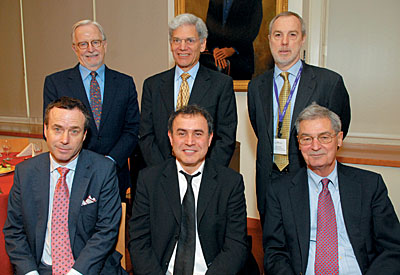
(From left to right, top row) Dean Thomas F. Cooley, Robert Litterman,
David Backus, (bottom row) Lionel Barber, Nouriel Roubini,
and Robert Lucas suggested ways to restore confidence in the
US economy.
|
Last spring, with housing prices plummeting, oil climbing toward
$120 a barrel, and the global financial system in shambles, industry,
media, and academic leaders convened at an NYU Stern breakfast forum
to discuss how to restore confidence in credit markets and the economy.
The event was part of Stern's Market Pulse Series, introduced by
Dean Thomas F. Cooley to tackle pressing global issues affecting
business and society. The event, "Economic Meltdown: Restoring Confidence
in Credit Markets," was co-presented by Stern's Alumni Council Finance
Committee and the Salomon Center for Research in Financial Institutions
and Markets and attended by alumni, students, and the press.
Moderated by David Backus, Stern's Heinz Riehl Professor of International
Economics and Finance, the panel included Lionel Barber, editor of
the Financial Times; Robert Litterman, chairman of the Quantitative
Investment Strategies group of Goldman Sachs Asset Management; Nobel
Laureate Robert E. Lucas Jr., an economist at University of Chicago;
and Nouriel Roubini, Stern professor of economics and international
business.
Litterman noted that financial models are showing a relatively short
recession with a strong recovery at the end of 2008 but warned that
the current spike in inflation could easily lead to a prolonged inflationary
period, as it did in the 1970s.
Barber suggested that the scale of the crisis represents excessive
risk-taking, causing a crisis of valuation that warrants a re-examination
of the US's regulatory framework. However, he cautioned against adopting
the British model of "financial super-regulator," reminding the audience
that the British Financial Services Authority failed dismally with
its first stress test, Northern Rock. Without a mandate for intervention,
he said, the Bank of England wasn't in a position to take the reins.
According to Lucas, the Federal Reserve's dramatic rate cuts mark
an overreaction and conflict with Chairman Bernanke's earlier promised
inflation-targeting strategy. He felt that one of the most serious
issues is that we take for granted that it's the Fed's job to resolve
the issues of the financial system. He is concerned about introducing
new regulations designed to solve old problems.
Roubini predicted a long, deep U-shaped recession as a result of
what he labeled a systemic financial crisis, involving the worst
housing recession since the Great Depression, credit losses that
could top $1 trillion, record oil prices, a credit crunch, and plummeting
consumer confidence. The key lesson, he said, is that non-banks are
subject to the same risks as banks and are systemically important,
suggesting the need for similar regulatory oversight.
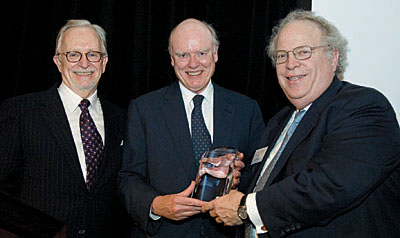 Dean Thomas F. Cooley (left) and William R. Berkley (right) honor
John Snow with the 2008 Charles Waldo Haskins Award at a celebratory
dinner in April.
Dean Thomas F. Cooley (left) and William R. Berkley (right) honor
John Snow with the 2008 Charles Waldo Haskins Award at a celebratory
dinner in April. |
NYU Stern Honors John Snow and
Celebrates
Donors at the 2008 Haskins Dinner
On April 1, NYU Stern alumni and friends gathered for the 2008 Haskins
Award Dinner at New York's Plaza Hotel. The gathering, which included
Stern's most dedicated and generous alumni, faculty, and friends,
celebrated a record $180 million raised over the last five years
during the Campaign for NYU Stern, surpassing its goal by $30 million
at the time.
At this event each year, the School bestows the Charles Waldo Haskins
Award on an outstanding individual whose career has been characterized
by the highest level of achievement in business and public service.
This year's recipient was the Honorable John W. Snow, chairman, Cerberus
Capital Management LP, and former US Treasury Secretary. In his acceptance
speech, Snow provided a lively and optimistic perspective on the
current economic situation, which he deemed in a healthy process
of readjustment. "America will get out of this," he asserted. "We
always do."
William R. Berkley (BS '66), chairman of the NYU Stern Board of Overseers,
spoke of the importance of providing stability in uncertain times
through education — which he called the great equalizer and builder
of dreams. In such times, he urged, it's more important than ever
to provide a strong education to future generations.
Ed Barr (BS '57), chairman of Stern's Campaign Steering Committee,
noted that while Campaign donors comprised a cadre of long-term supporters,
many new donors emerged in the last five years. He also talked about
the 40 new research, community-building, and curricular initiatives
the School launched through the support of the Campaign.
Rebecca Cohl, a second-year MBA student and recipient of the Harvey
Becker Scholarship with a Moral Contract, announced that 125 new
scholarships were made possible by the generous support of donors
over the last five years. Adam Brandenberger, J.P. Valles Professor
of Business Economics and Strategy, underlined the importance of
creating the right environment for ideas to flourish and told donors
they had funded 23 professorships and 10 faculty fellowships. Sally
Blount-Lyon, vice dean and dean of the Undergraduate College, thanked
donors for the more than 40 generous gifts that will help transform
Stern's physical environment. Finally, Carl Greene (MBA '60) announced
a 150 percent increase in Stern Fund dollars, describing these as
the School's lifeblood. The Campaign closed in August with a total
of $185 million, but there remain new opportunities to give back
to Stern as the need for gifts continues.
Chief Economist of the Asian Development Bank Speaks at Japan-US
Center
Dr. Ifzal Ali, chief economist for the Asian Development Bank, presented
the Bank's 2007 annual report on the economic health of Asian nations
to Stern students and faculty at an NYU Stern Japan-US Center event
held in early April.
Introduced by Edward Lincoln, director, Center for Japan-US Business
and Economic Studies, Ali discussed the surging growth of several
Asian economies. China led the group with the highest growth in 13
years, at 11.4 percent. The Philippines grew at 7.3 percent, a 30-year
high, while India grew at 8.7 percent, marginally lower than the
previous year. Ali predicted that the current economic slowdown in
the US, Europe, and Japan, rising energy and food prices, and the
credit crisis in the global markets would slow but not stop growth
in 2008. He also predicted that inflation will reach decade-long
highs in Asia this year.
New Directions in a Credit Crisis
Environment:
The Fifth Annual Credit Risk Conference

(Above, from left to right) Matthew Richardson,
Stephen Figlewski, Edward Altman, and Raymond McDaniel (right)
discussed the current credit crisis and recent advances in
risk managment at the annual Credit Risk Conference held at
NYU Stern in May. |
|
NYU Stern's Salomon Center and Moody's Corporation convened leading
academics and industry practitioners in May to discuss recent advances
in risk management within the context of lessons learned from the
credit crisis.
Matthew Richardson, Charles Simon Professor of Applied Financial
Economics and Sidney Homer Director of the Salomon Center at Stern,
introduced Moody's Chairman and CEO Raymond McDaniel, who cited the
multiple factors that contributed to the credit crisis, including
rising leverage, the overextension of housing credit, the deterioration
of underlying assets and due diligence, and the complexity and opacity
of products, which, combined, led to a loss of confidence in the
markets. McDaniel acknowledged that, in the absence of asset transparency,
the role of the ratings agencies had shifted from that of an information
intermediary between lenders and borrowers to an incentive intermediary
that markets relied on too much for recommendations. With this in
mind, McDaniel argued for more availability of information in the
public domain so that the opportunity for greater independent analysis
is widely available.
Stern Professor of Finance Stephen Figlewski presented new research
that explained the effect on credit risk of macroeconomic conditions
such as inflation and real GDP, as well as economic growth and financial
market conditions. He based his conclusions, in part, on an analysis
of defaults and ratings change data in Moody's Corporate Bond Default
Database between 1981 and 2002.
Edward Altman, Max L. Heine Professor of Finance at Stern, discussed
his research on the impact of credit markets on the overall economy,
noting that when default is high, recovery rates — which he defined
as the average price of bonds following a default — are low. He predicted
that recovery rates will fall dramatically from the past few years.
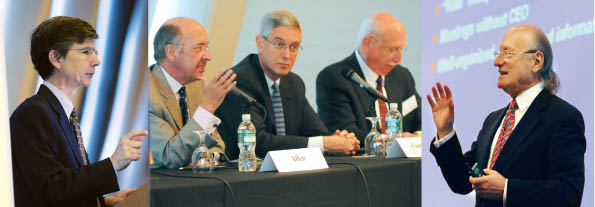
(From left to right) Joseph S. Tracey; William T. Allen; Doug Conant, president and CEO of Campbell's Soup Co.;
Richard J. Kogan, retired president and CEO of Schering-Plough Co.; and Reuben Mark
Sixth Annual NYU Directors' Institute Focuses on Boards during Uncertain
Times
The NYU Pollack Center for Law & Business,
a joint initiative between NYU Stern and NYU School of Law, in
May hosted its sixth annual Directors' Institute, "Service in the
Boardroom during Uncertain Times." Panelists represented the US
Securities and Exchange Commission, the Delaware Court of Chancery,
and the NYU Pollack Center for Law and Business, as well as directors
of Goldman Sachs Group Inc., Campbell Soup Co., and Schering-Plough
Co.
Joseph S. Tracy, executive vice president
and director of research at the Federal Reserve Bank of New York,
discussing the economy, predicted a relatively short and shallow
downturn due to aggressive policy response. Reuben Mark, chairman
of Colgate-Palmolive Co., the keynote speaker, described the strong
relationship between corporate culture and governance at Colgate-Palmolive.
William T. Allen, director of the NYU Pollack Center and Nusbaum
Professor of Law and Business, endorsed the legitimacy and importance
of the poison pill strategy in defending against hostile takeovers
and suggested that boards not preclude it from their arsenal, despite
objections from institutional shareholders. Martin Lipton, senior
partner at Wachtell, Lipton, Rosen & Katz and chairman of the
NYU Board of Trustees, discussed corporate governance, and Krishna
G. Palepu, Ross Graham Walker Professor of Business Administration
at Harvard Business School, emphasized that strategy was a useful
framework for all board responsibilities.
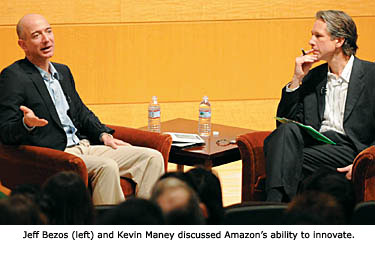
Amazon.com CEO Jeffrey Bezos Shares
His Business Strategy with Stern
Alumni and Students
In April, in partnership with Condé Nast Portfolio, NYU Stern hosted
the magazine's signature interview series, C-Circuit, which brought
Kevin Maney, contributing editor, and Jeffrey Bezos, CEO of Amazon.com,
together on campus to speak to alumni, students, and guests. A self-described
"change junkie," Bezos explained that having investors who focus
on the long term has enabled Amazon to pioneer controversial products
and strategies. |
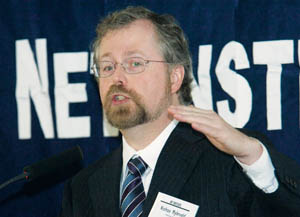
Nathan Myhrvold highlighted the emergence and influence of long-term exponential industries during his keynote address at the NET Institute Conference in April.
|
NYU Stern's NET Institute Conference Explores the "Exponential Economy"
In April, the Networks, Electronic Commerce, and Telecommunications
(NET) Institute and Stern's Entertainment, Media, and Technology
Program co-sponsored the NET Institute Conference at NYU Stern. The
conference featured new research on theoretical models of competition
in network markets, Internet search, and issues in network industries
presented by thought leaders from New York University, Harvard University,
London School of Economics and Political Science, Stanford University,
University of Pennsylvania, and Yale University, among others. Dean
Thomas F. Cooley kicked off the day-long event with opening remarks.
Nathan Myhrvold, founder and CEO of Intellectual Ventures, a company
focused on the funding, development, manufacturing, and marketing
of inventions, delivered the keynote speech, "The Exponential Economy."
He grouped technologies into three categories according to their
rate of growth — exponential, ordinary/logistic, and mature — and
highlighted the emergence of long-term exponential industries, such
as personal computing and communications, emphasizing their influence
in shaping the 21st-century global economy and guiding future research
and development policies.
Nicholas Economides, executive director of the NET Institute and
Stern professor of economics, commented that the conference "demonstrates
how Stern and the NET Institute encourage thought leadership and
remain on the forefront of research that influences business development
in network industries and informs today's public policy."
Philly Fed Chief Plosser Addresses Inaugural SoFiE Conference
Academics, business practitioners, and government officials convened
for the inaugural Society for Financial Econometrics (SoFiE) Conference
at NYU Stern in June to explore the ballooning field of financial
econometrics.
Sponsored by Stern's Salomon Center and Beyondbond, Inc., the three-day
event featured keynote speaker Charles I. Plosser, president and
CEO of the Federal Reserve Bank of Philadelphia, as well as leading
researchers from more than 15 universities, including NYU Stern,
MIT, Princeton University, Stanford University, University of Oxford,
and University of Pennsylvania.
"Having Philly Fed President Plosser and a number of distinguished
scholars on campus demonstrates how the Stern School and SoFiE are
leading the dialogue on financial econometrics," said Nobel Laureate
Robert Engle, SoFiE's co-president and founder and Michael Armellino
Professor of Finance at Stern. "The cutting-edge research discussed
at SoFiE's conference will inform future public policies and influence
financial markets around the world."
The World of Global Professional Services Takes the Stage at CeDER
Conference
Leading information systems academics, doctoral students, and IBM
researchers gathered at NYU Stern for the Global Delivery of Professional
Services Conference in May. Hosted by Stern's Center for Digital
Economy Research (CeDER) and sponsored by IBM, the conference featured
keynote speaker Joe Dzaluk, vice president of global infrastructure
and resource management at IBM, and seven panel discussions with
experts from more than 30 academic institutions from around the world,
including NYU Stern, HEC Montréal, MIT, and University of Texas at
Austin.
Panelists discussed risks and payoffs in outsourcing, sourcing models,
enabling agility in sourcing, sharing knowledge for innovation, and
the IT workforce. They compared the performance of globally distributed
teams to collocated teams, discussed the impact a large number of
vendors might have on innovation in knowledge-intensive activities,
and described when to open a wholly owned subsidiary offshore. IBM's
Dzaluk focused on the computer giant's operations in India, which,
with an integrated workforce of 73,000, is its second largest hub
worldwide, and the opportunities and challenges awaiting the company
in China.
One session focused on MBA courses on global sourcing — an area where
NYU Stern leads. Said Stern Professor Natalia Levina, conference
organizer and global sourcing expert: "We have been offering this
course since 2004. Given how new and critical this area is for businesses
worldwide, it is important to develop and share good teaching resources
such as cases, projects, and in-class exercises, and the conference
provided us with that opportunity."


![]()